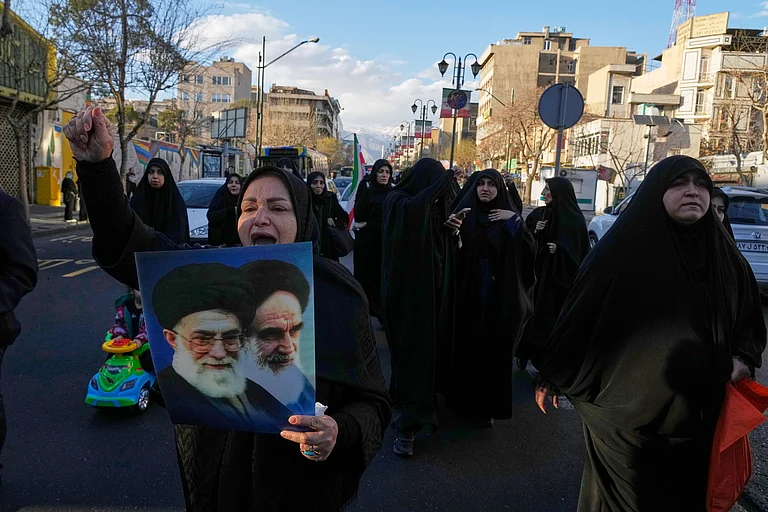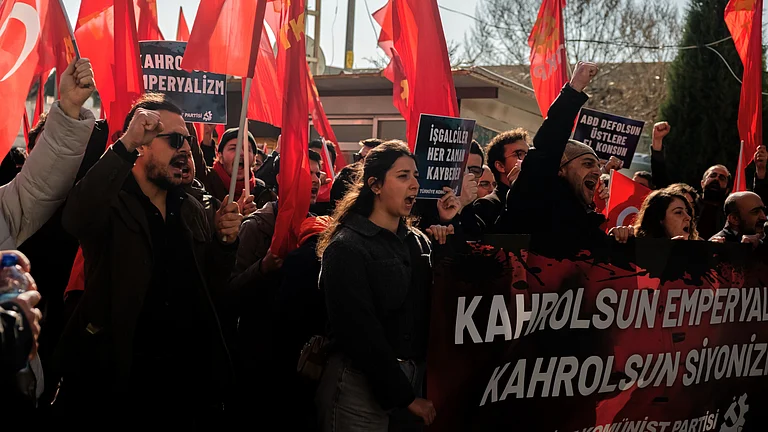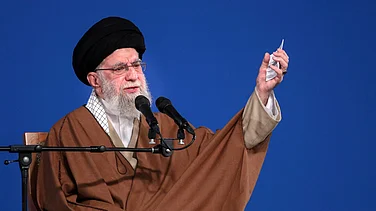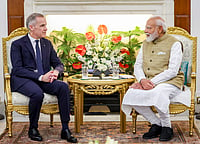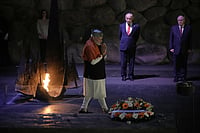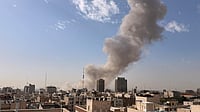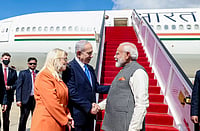Iran shrugged off its strategic patience on Tuesday and fired around 200 ballistic missiles towards Israel, triggering fears of a massive escalation of the ongoing war in an already volatile region. Following the firing, Netanyahu said, “Iran has made a big mistake and it will have to pay a price for it.” As Hamas and Hezbollah have both learnt, Israel’s retaliation can be devastating.
The missiles did not do much damage despite the claims of the Iranian Revolutionary Guards. Most of them were intercepted by both the Israeli air defence as well as firing from US naval destroyers deployed in the area. Israel and the US have said there would be “consequences” to the Iranian action. The already complicated situation in West Asia has taken a critical turn with Iran’s action even though the damage, according to initial reports, was minimal. Ironically, the only death reported is that of a Palestinian resident in Jericho in the Occupied West Bank. Unlike Israeli nationals who rushed to bomb shelters in place across the country, Palestinians do not have that luxury.
The US has also made it clear that it was in lock-step with Israel. The IDF said that Israel will retaliate at a time and date of its choosing. Tehran claimed that it had informed both the US and Russia before the ballistic missile attacks. Washington dismissed the suggestion of an advance warning.
In a statement issued by the IRGC on Monday, the elite military group said that Tuesday’s strikes were in response to the killing of Ismail Haniyeh, Sayyed Hassan Nasrallah, and Nilforooshan. The latter was the Iranian commander killed along with the Hezbollah leader. The IRGC defended its action saying that it was in line with Iran’s “right to legitimate self-defence as per the United Nations Charter, and in response to the regime's escalating crimes—backed by the United States—against the people of Lebanon and Gaza”.
The message from the IRGC signalled that the strike was merely a retaliation for the loss of these prominent leaders and that it was not in any way a declaration of war. Earlier in April, after Israel killed one of its top commanders in the Iranian mission in Damascus, there were symbolic tit-for-tat strikes at each other’s territories. Both sides were careful not to escalate the situation and attacks did not result in a full-scale war.
The IRGC did not factor in the change in the security situation. Israel is now on a winning spiral having killed most of the Hezbollah leadership and completely destroyed Gaza. Many of the top IDF commanders believe that this is the right time to continue the military victory and reshape the politics and strategic balance in West Asia, with Israel establishing its hegemony as the most important military and economic power in the region.
Iran’s dilemma
Tehran has for long ensured that while its proxies—Hezbollah, Hamas, the Houthis and scattered Shia fighters in Iraq, take aim at Israel, Iran stayed out of action. The Iranian leadership is well aware that Netanyahu is waiting for a chance to draw Iran into a direct war with Israel. Iran’s military has been considerably weakened by decades of US sanctions. Most of its defence equipment is old while Israel has state-of-the-art defence equipment and relies on the US to keep up the steady supply of sophisticated weapons. Despite all the bluster about hitting back, Iran realises that a military victory against Israel will not be easy. Israel with US backing is a formidable force that relies heavily on air power before a ground invasion. Troops also get air cover. So, knowing well that Netanyahu is looking out for a chance to hit Iran – he has been at it for decades – Tehran did not want to give him the opportunity.
The growing unrest among the people of Iran at the state of the economy, coupled with the fact that the theocratic regime brooks no opposition and insists on women covering their hair while out in public, has turned the young against the regime. The torture leading to the death of a young woman led to massive protests in Iran in 2022. Many would welcome a regime change. Stoking this unrest, Netanyahu in a direct message to the people of Iran said that Israel stood with them and understood their pain. He said the Jews and Persians had through history lived in peace with each other. This direct appeal to the Iranian people would have angered Supreme Leader Ali Khamenei, seeing it as Netanyahu instigating his people. Israel and its PM have in recent days not left any stone unturned to irritate Iran’s theocracy. The normally restrained Iranian leadership, however, realised that some action had to be taken.
The killing of Nasrallah, one of Iran’s most trusted allies, could not go without a token retaliation. There was public demand from the hardliners in Tehran and, according to reports, several IRGC commanders that action had to be taken, or the message would go down the line that Iran does not protect its own. So, some limited action could not be avoided.
Much will depend on what Israel does next. Netanyahu had long wanted to bomb Iran’s nuclear program. Will he try that now?









